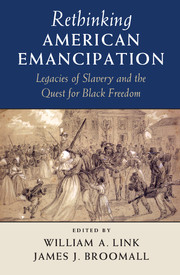Book contents
- Frontmatter
- Contents
- List of figures
- Notes on the Editors and Contributors
- Acknowledgments
- Introduction
- I CLAIMING EMANCIPATION
- II CONTESTING EMANCIPATION
- III REMEMBERING EMANCIPATION
- 7 African Americans and the Long Emancipation in New South Atlanta
- 8 Washington, Toussaint, and Bolivar, “The Glorious Advocates of Liberty”: Black Internationalism and Reimagining Emancipation
- 9 Remembering the Abolitionists and the Meanings of Freedom
- Epilogue: Emancipation and the Nation
- Index
7 - African Americans and the Long Emancipation in New South Atlanta
from III - REMEMBERING EMANCIPATION
Published online by Cambridge University Press: 05 November 2015
- Frontmatter
- Contents
- List of figures
- Notes on the Editors and Contributors
- Acknowledgments
- Introduction
- I CLAIMING EMANCIPATION
- II CONTESTING EMANCIPATION
- III REMEMBERING EMANCIPATION
- 7 African Americans and the Long Emancipation in New South Atlanta
- 8 Washington, Toussaint, and Bolivar, “The Glorious Advocates of Liberty”: Black Internationalism and Reimagining Emancipation
- 9 Remembering the Abolitionists and the Meanings of Freedom
- Epilogue: Emancipation and the Nation
- Index
Summary
Abraham Lincoln's Emancipation Proclamation, declared an early black historian in 1917, had “long since passed into history.” Most African Americans alive knew “little of the struggles which freedom cost, and less of the men and women by whose self-sacrificing toil that freedom was achieved.” The Civil War was an epochal struggle, in which African Americans “took such an active part” in their emancipation.” The past was misremembered and imperfectly written. Black participants in the Civil War – freedom fighters seeking to destroy slavery – had disappeared from battlefields and victories. These “noble and heroic men and women “remained largely forgotten.” The Reconstruction years provided a structure of political, economic, and social equality, but emancipation did not mean equality. A Long Emancipation – essentially, a struggle over the meaning of slavery's destruction – continued to define the parameters of freedom, long after the guns fell silent. Boundaries remained untested and undefined; the absence of slavery meant the end of chattel bondage but something less than freedom. In economic, legal, and political status, vestiges of slavery survived and were transformed under white supremacy.
The contested nature of the Long Emancipation becomes apparent in memories of the Civil War, how the past was constructed, and how it became useful to delineate the present. As historians show in a variety of instances and contexts, the generations after slavery refought the war by debating the meaning of slavery and freedom. Different versions of the past connected to how the present was defined. As David Blight reminds us, a powerful narrative placing reunion over race in remembering the Civil War took hold in early twentieth-century America.
A fledging town in the antebellum period, Atlanta became an important transportation, logistical, distribution, and manufacturing center of the western Confederacy. The resulting war boom drew in thousands of slaves, doubling the city's population, while its economic importance made it a target of William T. Sherman's arduous, four-month Atlanta Campaign during the summer of 1864. The city, besieged and conquered by Sherman's massive army, suffered extensive damage and destruction. Meanwhile, especially after the triumphant Atlanta Campaign, Sherman's invading force became an army of liberation, attracting scores of fleeing contrabands when it moved in its March to the Sea.
- Type
- Chapter
- Information
- Rethinking American EmancipationLegacies of Slavery and the Quest for Black Freedom, pp. 167 - 186Publisher: Cambridge University PressPrint publication year: 2015



